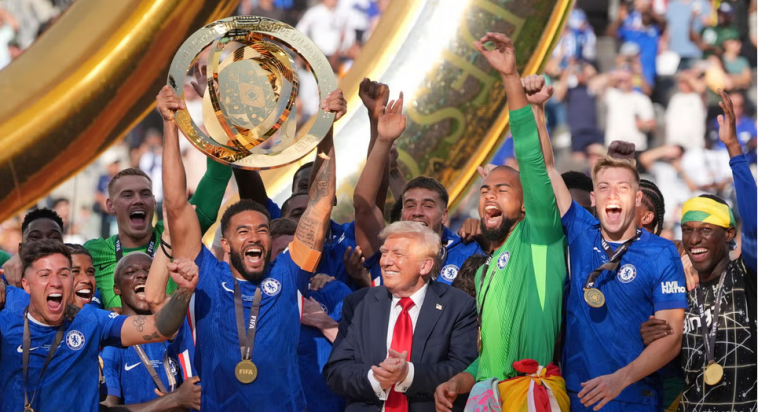Chelsea, managed by Enzo Maresca, entered the final as underdogs against a PSG side that had recently won the UEFA Champions League. Maresca orchestrated a tactical masterclass, setting Chelsea up to be defensively solid and devastatingly effective on the counter-attack. In classic surgical fashion, it wasn’t about having the ball, but what you did when you got it. Rather than attempting to dominate possession against a ball-dominant PSG, Chelsea focused on creating overloads in wide areas and exploiting the acres of space left behind PSG’s advancing players.
The key was the lightning speed of the transition. Upon winning the ball, Chelsea bypassed the midfield press with quick, direct, vertical passes. This approach was evident in the first goal, which originated from a long ball by goalkeeper Robert Sánchez and a subsequent mistake by PSG’s Nuno Mendes, leading to Malo Gusto setting up Cole Palmer. This strategy effectively nullified PSG’s possession game, turning their greatest strength into a glaring vulnerability by using the very space they vacated to attack. It was a rope-a-dope of the highest order.
TOP PERFORMERS
Cole Palmer was the undisputed man of the match, delivering a performance of immense quality and ice-cool composure. Operating with that intelligent, ghosting movement that top players have, he consistently found pockets of space between PSG’s defensive lines. His first goal was a clinical finish after finding himself unmarked in the box, a poacher’s instinct in a playmaker’s body. The second was a moment of individual brilliance; receiving a long pass from Levi Colwill, he cut inside, dummied a defender with a shimmy, and fired into the corner. For the third goal, Palmer turned provider, driving forward before threading a perfectly weighted pass for João Pedro. His ability to remain calm under pressure and make decisive, intelligent plays was the primary reason for Chelsea’s first-half dominance.
João Pedro, who had only recently signed for the club, made a significant and immediate impact. His role was to stretch the PSG defence with his tireless runs and provide a clinical finishing touch. He crowned a sensational first half for the Blues with a goal just before the break. Latching onto Palmer’s defence-splitting through-ball, he showed exceptional nerve to chip the ball over the onrushing Gianluigi Donnarumma. It was a finish that demonstrated not just technical skill but also the swagger and confidence that defined Chelsea’s entire performance.
HOW PSG WAS STIFLED
Paris Saint-Germain, despite being heavy favourites, were completely stifled and appeared utterly disrupted and dumbstruck by Chelsea’s first-half blitz. Their high defensive line was repeatedly and ruthlessly exposed by Chelsea’s quick transitions and direct balls. The relentless pressure from Chelsea’s forwards forced uncharacteristic errors from the PSG backline, as seen so clearly in the build-up to the opening goal.
Furthermore, PSG’s much-vaunted attack was largely neutralised. Goalkeeper Robert Sánchez made several crucial saves, including a notable stop from Ousmane Dembélé, which prevented PSG from gaining any foothold or momentum in the match. As the game wore on, PSG’s frustration became palpable, culminating in a red card for João Neves for petulantly pulling Marc Cucurella’s hair, which effectively ended any faint hope of a comeback. Maresca’s tactical setup forced PSG into a game they were not prepared for, leading to a humbling defeat.
NEXT SEASON
This Club World Cup triumph was far more than just another trophy for the cabinet; it was a powerful statement of intent. Under Enzo Maresca, Chelsea demonstrated a tactical identity that was both intelligent and lethal, dismantling one of Europe’s elite with surgical precision. This victory could very well be the catalyst that launches the club into a new era of success, built on tactical discipline and explosive, decisive attacking play.
Looking ahead to next season, the challenge will be to translate this knockout-competition brilliance into week-in, week-out consistency in the Premier League. If they can maintain this level of performance and tactical cohesion, Chelsea should be considered genuine contenders for the league title and are poised for a deep run in the Champions League. The key will be avoiding complacency and building on this formidable foundation.
However, to sustain a challenge on all fronts, a couple of areas need strengthening:
Dominant Central Midfielder: While the counter-attack was devastating, the strategy relied on bypassing the midfield. To control games against teams that sit in a low block, a commanding central midfielder who can dictate tempo and unpick a packed defence is essential.
Central Defensive Leader: The defence was solid, but another top-tier, experienced central defender would add crucial depth and leadership for the long campaign ahead, providing competition and cover for the existing personnel.
Proven Goalscorer: While João Pedro started brightly, relying on a new signing and the creative force of Palmer for the bulk of the goals is a risk. Adding another elite striker would provide a different attacking dimension and guarantee the goals needed to turn tight draws into wins, which is often the difference between being a contender and a champion.





